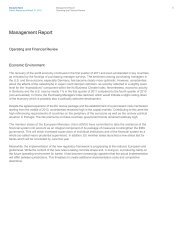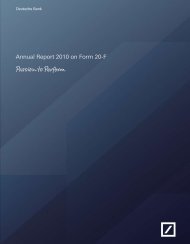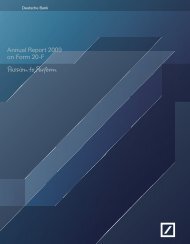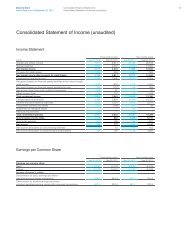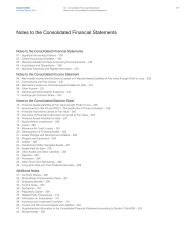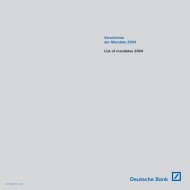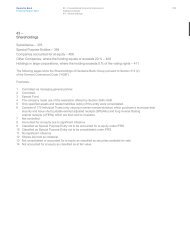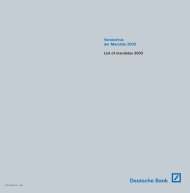entire - Deutsche Bank Annual Report 2012
entire - Deutsche Bank Annual Report 2012
entire - Deutsche Bank Annual Report 2012
You also want an ePaper? Increase the reach of your titles
YUMPU automatically turns print PDFs into web optimized ePapers that Google loves.
<strong>Deutsche</strong> <strong>Bank</strong> 05 – Supplementary Information 404<br />
Financial <strong>Report</strong> 2010 Glossary<br />
FICO Scores<br />
FICO is an acronym for the Fair Isaac<br />
Corporation, the creators of the FICO score.<br />
Using mathematical models, the FICO<br />
score takes into account various factors in<br />
each of these five areas to determine credit<br />
risk: Payment history, current level of indebtedness,<br />
types of credit used, length of<br />
credit history, and new credit. A FICO score<br />
will range between 300 and 850. In general,<br />
a FICO score above 650 indicates that the<br />
individual has a very good credit history. For<br />
scores below 620 it will often be more difficult<br />
to obtain financing at a favorable rate.<br />
Futures<br />
Forward contracts standardized with respect<br />
to quantity, quality and delivery date,<br />
in which an instrument traded on the money,<br />
capital, precious metal or foreign exchange<br />
markets, is to be delivered or received at an<br />
agreed price at a certain future time. Cash<br />
settlement is often stipulated for such contracts<br />
(e.g. futures based on equity indices)<br />
to meet the obligation (instead of delivery or<br />
receipt of securities).<br />
G<br />
German Solvency Regulation<br />
German regulation governing the capital<br />
adequacy of institutions, groups of institutions<br />
and financial holding groups which,<br />
adopted the revised capital framework of<br />
the Basel Committee from 2004, widely<br />
referred to as Basel II, into German law.<br />
Goodwill<br />
An asset representing the future economic<br />
benefits from assets acquired in a business<br />
combination that are not individually<br />
identifiable. Goodwill is recognized as the<br />
positive excess amount between the fair<br />
values of the consideration transferred by<br />
the acquirer and the identifiable assets and<br />
liabilities of the acquired business.<br />
H<br />
Hedge Accounting<br />
Financial reporting of agreements in a<br />
hedging relationship which is subject to<br />
certain conditions. The relationship between<br />
the agreements is based on opposite terms<br />
which cause financial risks that can be<br />
compensated in whole or part due to the<br />
terms of these agreements. One agreement<br />
is usually referred to as underlying transaction<br />
– i.e. the contract that causes the risk –<br />
the other is referred to as hedging contract,<br />
which mitigates the risk.<br />
Hedge Fund<br />
A fund whose investors are generally institutions<br />
and wealthy individuals. Hedge funds<br />
are part of alternative investments. They<br />
are subject to less stringent or no regulatory<br />
obligations and can therefore employ strategies<br />
which mutual funds are not permitted<br />
to use, e.g. strategies involving short selling,<br />
leveraging and derivatives. Hedge funds<br />
offer chances for high profits but also bear<br />
the risk of losing invested capital, thus their<br />
returns are uncorrelated with traditional<br />
investment returns.<br />
High Yield Debt<br />
Fixed income securities where the issuer<br />
has a low credit rating. They offer a higher<br />
return than investment-grade securities but<br />
also entail greater risks.<br />
I<br />
IFRS (International Financial <strong>Report</strong>ing<br />
Standards)/previously IAS (International<br />
Accounting Standards)<br />
Financial <strong>Report</strong>ing Rules of the International<br />
Accounting Standards Board designed<br />
to ensure globally transparent and<br />
comparable accounting and disclosure.<br />
Main objective is to present information that<br />
is useful in making economic decisions,<br />
mainly for investors.<br />
Investment <strong>Bank</strong>ing<br />
Generic term for capital market-oriented<br />
business. This includes primarily the issuance<br />
and trading of securities and their<br />
derivatives, interest and currency management,<br />
corporate finance, M&A advisory,<br />
structured finance and private equity.<br />
L<br />
Leveraged Financing<br />
Financing of an investment which typically<br />
includes a very high amount of external<br />
debt (leverage) in the purchase price<br />
financing.<br />
Leverage Ratio<br />
The ratio of total assets to equity.<br />
Liquidity Risk<br />
The risk arising from the Group’s potential<br />
inability to meet all payment obligations<br />
when they come due or only being able to<br />
meet these obligations at excessive costs.<br />
Loan-to-value (LTV) Ratios<br />
Ratio of amount of loan to value of property.<br />
Loss Given Default (LGD)<br />
The likely loss intensity in case of a counterparty<br />
default. Its estimation represents,<br />
expressed as a percentage, the part of the<br />
exposure that cannot be recovered in a<br />
default event and therefore captures the<br />
severity of a loss.<br />
M<br />
Market Risk<br />
The risk that arises from the uncertainty<br />
concerning changes in market prices and<br />
rates (including interest rates, equity prices,<br />
foreign exchange rates and commodity<br />
prices), the correlations among them and<br />
their levels of volatility.<br />
Mark-to-market Valuation<br />
Valuation at current market prices. Applies,<br />
for instance, to trading activities.




